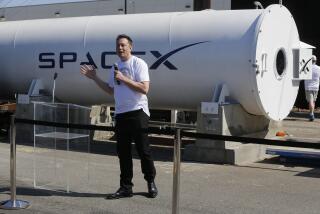Work Starts on Superhighway of Knowledge
- Share via
In the 1950s, the big push in this country was to build an interstate highway network that would speed transportation and stimulate economic growth.
Now there’s another kind of network on the horizon that promises to be as important as the one that carries trucks and cars. It will carry information.
Considering the highly developed state of the nation’s communications systems, it may seem surprising to say that an information network is needed. The network in question, however, is one that would tie together vast numbers of computers and their scientific data and do it in a manner that will spur the pace of technological advancement.
Computer networks have existed since the 1960s, but, as Sam Fuller, vice president for research at Digital Equipment, puts it, “We have a bunch of dirt roads and one or two highly publicized 20-mile segments.”
Hopefully, this system won’t require the massive appropriations and tax revenues that were required to build the superhighways. In fact, there’s a reasonable chance it will be done largely with funds from private industry.
An effort to develop such a network has been launched by Robert Kahn, who until last fall was director of the office of information processing techniques at the Defense Advanced Research Projects Agency (DARPA). The agency, under Kahn’s influence, sponsored some of the pioneering work in computer networking, making it possible for research organizations to interact with each other electronically.
Kahn has created the nonprofit Corporation for National Research Initiatives with the goal of getting major U.S. companies to fund development of a highly sophisticated system to share scientific information among corporate and other research groups so that each could build on the others’ knowledge. So far, he has received $500,000 from Digital and a similar sum from Xerox to start the ball rolling.
Three-Part Proposal
There are three parts to the Kahn proposal. The first job is to build a knowledge bank with the latest in scientific data. The bank would permit someone doing research in, say, organic chemistry, to have access to the latest work in that field done by others.
But Kahn wants to go further. It’s fine to have the Einstein theory of relativity in the bank, but what’s needed is to be able to retrieve knowledge, not just what’s been published. In short, over many years, Kahn hopes to get into computer memories the very thought processes that go into developing such theories. “We need to find a way to codify this knowledge,” he explains.
As this information builds up in the knowledge bank, the next step would be to devise ways to make it available electronically to research organizations across the country. Finally, there would be an effort to turn the system into a marketplace through which users would purchase technological information electronically, vastly simplifying the marketing and purchasing of this material. Companies would be able to move much faster as technology changes.
Why should companies be willing to fund a nonprofit effort when the information will be available to everybody?
Fuller of Digital sees clear advantages. Building such a network in the Unitied States should help make the computer electronics industry here more competitive with the rest of the world. It should make those companies involved most intimately in the development of the system more aware of the components markets that may be created as a result.
“We need to build a better electronics infrastructure in this nation if we’re going to remain a competitive force in the world,” he adds. Digital itself has an internal network tying together about 4,000 locations. “If we could extend our internal network so we could talk to customers and others on the same basis, it would be a major step.”
Fuller also points out that just getting rid of the paper shuffling in research operations would be a big help. “My office is still filled with paper messages--we have a long way to go,” he says.
The Kahn effort will require a decade or two to succeed. It’s important that it is starting now.




